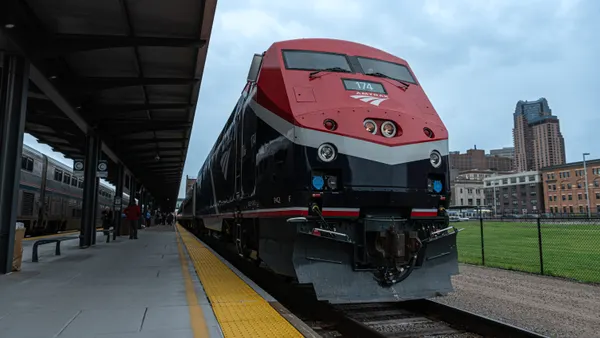Dive Brief:
- The San Francisco Municipal Transit Agency (SFMTA) has issued a conditional private transit operator permit to shuttle company Chariot, which is owned by Ford.
- SFMTA worked with Chariot during the review process to relocate more than 100 stops from illegal to safe loading areas. The permit's conditions require Chariot to find safe, legal alternative loading areas for the remaining 9% of its more than 200 stops by August.
- This is the first — and thus far, only — permit SFMTA has granted since adopting new private transit operator regulations in October.
Dive Insight:
San Francisco has a reputation for being a transit forward city, with a plethora of options such as streetcars, buses, subways, ferries and commuter shuttles. The city is known for progressive attitudes toward transportation and fostering an innovative atmosphere to create more options and reduce single-passenger vehicle trips. For example, the Bay Area is the birthplace of ride-share companies Uber and Lyft, as well as dockless bike-share companies LimeBike and Spin. Chariot is also based in San Francisco.
But what the city had been lacking until last October was a modern, widespread plan for private transit. San Francisco did have regulations in place decades ago when jitneys were popular, but that type of mobility fell out of favor. The city repealed its jitney regulations in 2011 but reexamined them due to complaints when new private transit carriers, such as Chariot, began reappearing in 2014.
The regulations enacted last year tackle a number of issues that have arisen with modern private transit, and modern transportation in general. Truth be told, Chariot had been operating without oversight for years during the time period without private transit regulations, and some of SFMTA's regulatory actions likely are a direct response to complaints about the service.
SFMTA must review stops to ensure they are legal and safe, as evidenced by the agency working with Chariot to relocate existing stops. This prevents safety problems and complaints that often accompany transportation like ride-share, in which drivers stop cold or in inappropriate areas such as crosswalks. Per the regulations, private transit operators must choose routes and stops that complement, but do not compete with, municipal transit. That mitigates another ride-share complaint, that the service has drastically cut into municipal transit ridership throughout the country. Private operators also must share GPS and ridership data with SFMTA.
In an email to Smart Cities Dive, a Chariot spokeswoman welcomed the news. "We are proud to have collaborated with SFMTA on the new permitting process, which will allow us to continue to provide a reliable, daily transportation solution that reduces congestion on our roads, as well as offers skilled career opportunities to our Teamster workforce, nearly half of whom are San Francisco residents," she said.












